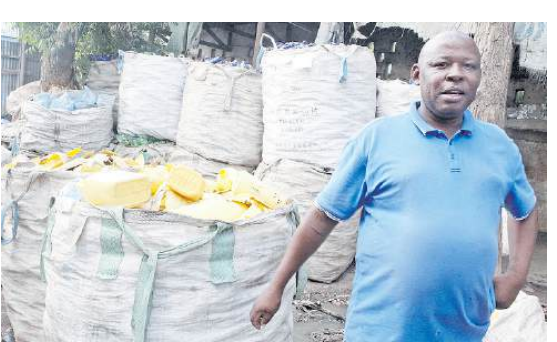
The ‘plastic man’ turning bottles into fancy decor
Kilifi artisan Raymond Katana is proving a hit with coastal decorators.
In 2021, Kenya imported about 575,290 tonnes of raw plastic materials, valued at Sh98.2 billion.
In Summary

Audio By Vocalize

Kenyans, especially in urban areas and along the coastline, are grappling with how to cope with huge volumes of plastic waste along the streets or in their neighbourhoods.
Currently, the country generates an estimated 966,000 tonnes of plastic waste annually, which according to the United Nations Conference on Trade and Development (UNCTAD) is expected to rise to five million by 2030.
In 2021, Kenya imported about 575,290 tonnes of raw plastic materials, valued at Sh98.2 billion.
While the government has taken steps to address the problem, such as banning single-use plastic bags in 2017 and extending the ban to protected areas in 2020, plastic pollution remains a major concern.
Kenya recycles only eight per cent to 10 per cent of its plastic waste, making plastic pollution a pressing concern, according to a report by the Kenya Private Sector Alliance (Kepsa) in 2023.
As we prepare for World Environment Day set for June 5, which is themed ‘Global Call to End Plastic Pollution,’ here in Garissa, we meet Fred Olingo, the founder of Taka ni Mali focusing on recycling of plastic waste.
As we walk into his recycling plant in Garissa town, we meet with women - young and old and some young men carrying empty sacks on their shoulders, evidence they have just sold their assorted plastic materials.
Sixty-five-year-old Kasembi Paul has just sold a batch of her day’s collection.
She started collecting and selling plastic water bottles in 2018, which has been taking care of her daily necessities and school fees for her children.
Kasembi said on a good day, she can make up to Sh2,000 while on bad days, she makes close to Sh900.
“I have a daughter who has just completed Form 4 and she is now in college. All that fee comes from here,” she said.
“The challenge is that sometimes we walk long distances because there are many of us collecting these bottles and we have depleted these plastic wastes in areas closer to town. This job has provided an opportunity for many young people where they can earn something instead of getting into crime.”
Olingo founded his company in 2016 while in Nakuru but it did not pick up there because of low availability of plastic bottles.
“I started this job in Nakuru county but there was little we could do because there are not as many plastics as here in Garissa. Nakuru is sometimes cold and not many people use bottled water. A friend of mine then referred me to Garissa because with water challenges, there is high usage of bottled water and that’s where we come in,” he said.
“When I came here in 2016, plastic water bottles were everywhere, even in the drainage lines. The county council was struggling on how to deal with them because the bottles were the main waste. In just one week, I managed to get over 10 tonnes of plastic water bottles and that is how I decided to remain here,” he said.
Olingo has employed 20 casual workers on busy days although the number is slightly reduced on days with little operations.
Close to 50 people, who move around the town, hotels and sometimes attend public forums to collect empty water bottles also get their daily bread here.
Once someone brings plastic waste for sale, it is sorted according to the type of plastic, and weighed to determine the amount.
The plastic materials are then further sorted according to colour, stickers on the materials are removed and then it is crushed into small pieces ready to be transported for sale to other processing companies.
According to Olingo, a kilogramme of water plastic bottles is priced at Sh25 although sometimes, the amount is slightly increased to boost the morale of the collectors.
The Taka ni Mali founder said over time, other people have joined the business, and now there is stiff competition in the sector.
“Apart from competition, we have a challenge in getting county permits. Sometimes a licence costs Sh30,000 for operations and then they still charge you cess when transporting the materials. We hope that this issue can be sorted out,” he said.
Isaac Kimitei, the Nema director for Garissa county said that with collaboration with other stakeholders, they have been able to reduce plastic waste in the county.

Kilifi artisan Raymond Katana is proving a hit with coastal decorators.